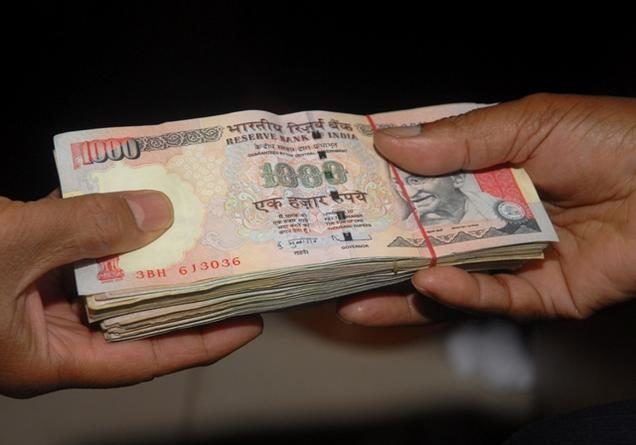“केंद्र सरकार भ्रष्टाचाऱ्यांना मदत करणारा कायदा आणत आहे”
आमच्या लेखांच्या अपडेट्स मिळवण्यासाठी आमच्या फेसबुक पेजला नक्की Like करा: facebook.com/InMarathi.page
===
देशात सर्वत्र नरेंद्र मोदींच्या “demonetization” ची चर्चा सुरू आहे. ह्या निर्णयाचे, निर्णयाच्या अंमलबजावणीचे बरे-वाईट पडसाद उमटत असताना, त्यावर घमासान चर्चा होत असताना “स्वराज भारत” ह्या राजकीय पक्षाचे अध्यक्ष, योगेंद्र यादवांनी केंद्र सरकारवर एक मोठा गंभीर आरोप केला आहे.
The Hindu ह्या नियतकालिकात लिहिलेल्या लेखात, यादवांनी हा आरोप केला आहे की “Prevention of Corruption” ह्या वरकरणी भ्रष्टाचार विरोधी वाटणाऱ्या कायद्यात केंद्र सरकार असे बदल आणू पहात आहेत की ज्यामुळे भ्रष्टाचाऱ्यांचं रक्षण आणि तक्रार करण्याचं नुकसान होण्याची शक्यता आहे.

योगेंद्र यादवांच्या लेखाचा सारांश असा:
While everyone is busy debating demonetisation, Parliament is all set to change the Prevention of Corruption Act (PCA), 1988, into a law that can only be described as Protection of the Corrupt Act. Worse, this move enjoys cross-party support, as in most instances where the political establishment protects itself. All in the name of war against black money, of course.
===
संपूर्ण देश निश्चलनीकरण वरील चर्चेत गुंतलेला असताना, संसद “Prevention of Corruption Act (PCA), 1988” चं एका अश्या कायद्यात रूपांतर करण्यास तयार आहे ज्याला केवळ Protection of the Corrupt Act असेच म्हणता येईल. ह्याहून वाईट गोष्ट अशी की ह्या बदलास सर्व पक्षीय समर्थन आहे – कारण बहुतेक प्रत्येक वेळा राजकीय व्यवस्था स्वतःला सुरक्षित ठेवतच असते. अर्थात, हे सर्व “काळ्या पैश्याविरुद्धची लढाई” ह्या नावाखाली होत आहे.
हा मोठा गंभीर आरोप आहे.
कायद्याचं नाव ऐकून असं वाटतं की हा भ्रष्टाचाराच्या विरोधातील म्हणजेच भ्रष्ट लोकांचं शासन करणारा कायदा आहे. परंतु यादवांचा आरोप आहे की कायदा “भ्रष्ट लोकांचं संरक्षण” करण्यासाठी बदलला जात आहे!
हे बदल नेमके काय आहेत, हे स्पष्ट करताना यादव लिहितात:
As it stands now in the version cleared by the Select Committee in August this year, the Bill serves to dilute and defeat the whole point of anti-corruption legislation in more ways than one. It narrows down the existing definition of corruption, increases the burden of proof necessary for punishing the corrupt, makes things more difficult for the whistle-blower, and strengthens the shield available to officials accused of corruption. And it slips in a diabolic clause that would protect the babu-neta nexus from ever facing any serious anti-corruption probe. If this Bill becomes law, our already weak anti-corruption mechanism would receive a fatal blow.
===
Select Committee ने ह्या वर्षी ऑगस्टमधे पास केलेल्या version नुसार – हा प्रास्ताविक कायदा anti-corruption कायद्यचा मूळ हेतूच गढूळ आणि पराभूत करतो. हा कायदा अस्तित्वात असलेल्या “भ्रष्टाचार” ची व्याख्या आणखी छोटी करतो, भ्रष्ट लोकांना शासन होण्यासाठी आवश्यक असणाऱ्या proof ची आवश्यकता वाढवतो, भ्रष्टाचार विरोधी आवाज उठवणाऱ्या लोकांसाठी गोष्टी आणखी अवघड करून ठेवतो आणि भ्रष्टाचाराचा आरोप असणाऱ्या सरकारी कर्मचाऱ्याना ढाल उपलब्ध करून देतो. आणि (शिवाय) एक असा राक्षसी clause (प्रावधान) घुसवतो, जो बाबू-नेता साटेलोटे कुठल्याही भ्रष्टाचाराच्या चौकशीपासून वाचवेल. जर ह्या प्रस्तावाचं कायद्यात रूपांतर झालं तर already नाजूक असलेल्या भ्रष्टाचार विरोधी व्यवस्थेवर हा मोठा आघात असेल.

वरील सर्व आरोप, यादवांनी मुद्देसूद स्पष्ट करून सांगितले आहेत.
सर्वप्रथम, ते “Corruption” ची व्याख्या कशी बदलली जात आहे, हे स्पष्ट करतात.
Section 13(1)(d) of the existing PCA covers various indirect forms of corruption including the obtaining of “any valuable thing or pecuniary advantage” by illegal gratification or by “abusing his position as a public servant”. The present Bill removes this section and replaces it with a truncated definition of criminal misconduct by a public servant: fraudulent misappropriation of property under one’s control, and intentional, illicit enrichment and possession of disproportionate assets.
म्हणजेच, सध्याची व्याख्या सोप्या शब्दात – “आपल्या अधिकारातून कुणाचे तरी बेकायदेशीर समाधान (म्हणजेच, काम, लाभ इत्यादी) करून देऊन कुठलाही मौल्यवान किंवा आर्थिक लाभ मिळवणे” – अशी आहे.
ह्या व्याखेतील प्रस्तावित बदल काय आहे? तर ते असे –
“मालमत्तेतील फसवी व गैर वाढ आणि संपत्तीतील जाणीवपूर्वक, बेकायदेशीर मूल्य वाढ आणि बेकायदेशी मालकी”
थोडक्यात –
भ्रष्टाचार फक्त “संपत्ती” आणि “मालमत्ता” पुरता सीमित करण्यात येत आहे!
पण वस्तुस्थिती अशी आहे की साटेलोटे प्रकारात कित्येकवेळा बेकायदेशीर आणि डायरेक्ट लाभ दिसत नसतात! आणि हाच यादवांचा आक्षेप आहे. ते म्हणतात –
Under this new definition, any benefit that is not economic, that is indirect or that cannot be proven to be intentional fraud will not be punished as corruption.
===
ह्या नव्या व्याख्येनुसार, कुठलाही असा लाभ – जो आर्थिक नाही, डायरेक्ट (म्हणजे सरळ सरळ संबंध सिद्ध करणारा) नाहीये किंवा जो ‘जाणीवपूर्वक’ असल्याचं सिद्ध करता येणार नाही (म्हणजेच अश्या प्रकारचा आर्थिक लाभ किंवा सरळ संबंध जाणीवपूर्वक केला गेला होता, हे सिद्ध करणारा सिद्ध करता येणार नाही) तो भ्रष्टाचार असणार नाही.
धक्कादायक…केवळ धक्कादायक!
योगेंद्र यादवांच्या म्हणण्यानुसार लॉ कमिशनने हे बदल रद्द केले होते, शिवाय भ्रष्टाचाराची व्याख्या आणखी व्यापक करण्याचे संकेत दिले होते. कमिशनच्या सुचनेनुसार –
any “undue advantage” that results from “improper performance of public function or activity” of a public servant
– अश्या सर्वांना शिक्षा व्हावयास हवी.
परंतु सरकारने लॉ कमिशनच्या सूचनांचा अव्हेर केला.
दुसरा आरोप – “बर्डन ऑफ प्रूफ” वाढवण्याचा.
Under the existing law, the possession of monetary resources or property disproportionate to the public servant’s known sources of income is enough to prove corruption. Now the prosecutor will also have to prove that this disproportionate asset was acquired with the intention of the public servant to enrich himself illicitly.
===
…currently, “known sources of income” are limited only to those receipts which had been “intimated in accordance with the provisions of any law, rules or orders for the time being applicable to a public servant”…Strangely, the government proposes to delete this requirement without any recommendation to this effect from any stakeholder.
इथे २ गोष्टी घडत आहेत.
१) पूर्वी, आरोपीच्या सोर्सेस आणि त्याच्या संपत्तीचा ताळमेळ लागत नसेल तर भ्रष्टाचाराची केस सिद्ध मानली जायची. पण आता, आरोप करणाऱ्याने, “बेकायदेशीर/गैर हेतू” सिद्ध करणे अपेक्षित आहे…!
२) पूर्वी कायदेशीर मार्गाने मिळविलेले आणि दाखवलेले अर्थ लाभच “known sources of income” म्हणून गृहीत धरले जायचे. परंतु आता सरकारने ही अट शिथील करण्याचं ठरवलं आहे!

तिसरा आरोप अधिक गंभीर आहे.
Under the existing law, if a person makes a statement during a corruption trial that he gave a bribe, it would not be used to prosecute him for the offence of abetment of corruption. The current Bill omits this provision and proposes that bribe-taking and bribe-giving will be equally punishable.
पूर्वी – लाच देणाऱ्याने जर कोर्टात साक्ष दिली तर त्याच्यावरील “भ्रष्टाचारास मदत” केल्याचा खटला/आरोप रद्द होत असे. परंतु आता सरकारने लाच देणे आणि घेणे दोन्ही सारखेच गंभीर गुन्हे आहेत असा stand घेतलाय.
अर्थात, भ्रष्टाचारात लाच देणारा आणि घेणारा, दोन्ही दोषी असावेतच. परंतु दोन्ही गुन्हे सारखेच severe मानले तर सरकारी अधिकाऱ्याविरुद्ध साक्ष द्यायला येणे, त्या विरुद्ध आपल्याकडे असलेले पुरावे देणे ह्या मार्गालाच खीळ बसेल…आणि त्यामुळे “बाबू” लोकांचं (सरकारी अधिकारी) फावेल.
चौथा आणि शेवटचा आरोप —
It (government) also adds another unnecessary and pointless condition. If a private person approaches the government for sanction to prosecute a public servant for corruption, he would now need a court order to this effect. This additional layer of protection for the accused would discourage victims of corruption and anti-corruption activists from prosecuting corrupt public servants.
ह्यापुढे, कुठल्याही व्यक्तीला एखाद्या अधिकाऱ्याविरुद्ध सरकारने भ्रष्टाचाराचा खटला दाखल करावा असं वाटत असेल तर त्याला आधी कोर्ट ऑर्डर घ्यावी लागेल…!
ह्या आधी केवळ सरकारी अधिकाऱ्यांची परवानगी पुरेशी असायची. कोर्ट ऑर्डर आवश्यक केल्यास कित्येक लोक पुढे येण्यास कचरतील हे स्पष्ट आहे.
ह्याहून भयानक आहे, तो सरकारने वाढवलेला आणखी एक clause :
It proposes to insert a new Section 17A that would bar investigating agencies from even beginning an inquiry or investigating the offences under this Act without prior approval.
आता भ्रष्ट अधिकाऱ्याविरुद्ध चौकशी करण्याचे स्वायत्त अधिकार चौकशी यंत्रणेकढून काढून घेतले जाण्याची शक्यता आहे. कुठल्याही अधिकाऱ्याची चौकशी करायची असेल तर “an “authority competent to remove” the person from office” – म्हणजेच, effectively नेता लोकांच्या परमिशनची गरज असणार आहे.

ह्यावरूनच योगेंद्र यादवांचं conclusion आहे की –
Clearly, the government is concerned more about shielding government officials than prosecuting the corrupt.
योगेंद्र यादवांचा एकही आक्षेप अयोग्य वाटत नाही. सरकार असं खरंच करू पहात असेल तर हे सामान्य जनतेसाठी काळजीचं कारण आहे.
(इच्छुकासाठी प्रस्तावित बदलांची माहिती देणारी लिंक: The Prevention of Corruption (Amendment) Bill, 2013 )
—
===
InMarathi.com वर विविध लेखकांनी व्यक्त केलेले विचार ही त्यांची वैयक्तिक मतं असतात. InMarathi.com त्या मतांशी सहमत असेलच असं नाही. | आमच्या लेखांच्या अपडेट्स मिळवण्यासाठी आमच्या फेसबुक पेजला नक्की Like करा: facebook.com/InMarathi.page । Copyright (c) 2017 InMarathi.com | All rights reserved.





